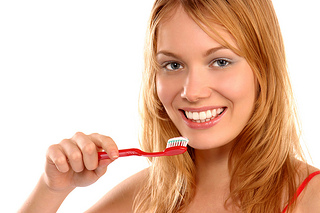Are you at risk for tooth erosion?
December 7th, 2023

Many people consume carbonated or sugary drinks and acidic foods every day but have no idea those beverages may be harming their teeth, making them vulnerable to tooth erosion. The acid in the foods we eat and drink can cause tooth enamel to wear away, making your teeth sensitive and discolored. Dr. Meuselbach will tell you that in many cases, what’s important is not what you eat and drink, but rather how you consume it.
What is tooth erosion?
Tooth erosion is the loss of tooth structure caused by the weakening of dental enamel, which is the strongest substance in the human body. Enamel is the thin, outer layer of hard tissue that helps maintain the tooth’s structure and shape. When the enamel is weakened, it exposes the underlying dentin, causing your teeth to appear yellow.
What causes tooth erosion?
Tooth erosion may occur when the acids in the foods and beverages you eat and drink, as well as other factors we will discuss later, weaken the enamel on your teeth. Typically the calcium contained in saliva will help remineralize (strengthen) your teeth after you consume foods or drinks that contain some acid. However, the presence of a lot of acid in your mouth does not allow for remineralization to happen.
Acid can come from many sources, including the following:
- Drinking carbonated or fruit drinks. All soft drinks (even diet varieties) contain a lot of acid and are capable of dissolving enamel on your teeth. Bacteria thrive on sugar and produce high acid levels that can eat away at enamel.
- Eating sour foods or candies. All those sour candies may taste great, but these treats can be acidic to your teeth. Sour and fruity candy, such as Starburst and Skittles, are the worst for your teeth since these candies have a low pH value, which is known to ruin enamel.
- Low saliva volume. Saliva helps prevent decay by neutralizing acids and washing away leftover food in your mouth.
- Acid reflux disease. Acid reflux, or GERD, brings stomach acids up to the mouth, where the acids can erode enamel.
- Bulimia or binge drinking. These conditions can cause tooth damage because they frequently expose teeth to stomach acids.
- Wear and tear. Brushing your teeth too vigorously or grinding your teeth at night can erode enamel.
What are the symptoms of tooth erosion?
Acid wear may lead to serious dental problems. When your tooth enamel erodes, your teeth become more vulnerable to cavities and decay, and you may begin noticing the following symptoms:
- Severe sensitivity or tooth pain when consuming hot, cold, or sugary foods or drinks
- Tooth discoloration
- Rounded teeth
- Transparent teeth
- Visible cracks in teeth
- Cupping, or dents, that show up on the biting or chewing surfaces of the teeth
What you can do to prevent tooth erosion
- Reduce or eliminate altogether your consumption of carbonated drinks. Instead, sip water, milk, or tea.
- If you must consume acidic drinks, drink them quickly and be sure to use a straw so that the liquid is pushed to the back of the mouth. Don’t swish them around or hold them in your mouth for a long period of time.
- Instead of snacking on acidic foods throughout the day, we suggest eating these foods just during meal times in order to minimize the amount of time the acid makes contact with your teeth.
- After consuming highly acidic food or drinks, rinse with water to neutralize the acids.
- Chew sugar-free gum to produce more saliva, as this helps your teeth remineralize.
- Brush with a soft toothbrush and be sure your toothpaste contains fluoride.
- Dr. Meuselbach may also recommend daily use of a toothpaste to reduce sensitivity (over-the-counter or prescription strength) or other products to counter the effects of erosion.
It’s important to know that the majority of dental problems, such as tooth erosion, do not become visible or painful until they are advanced. And, unfortunately, serious oral issues are painful and expensive to treat. A deep cleaning twice a year by our team at Robert Scott Meuselbach DDS is the best way to hit all the spots you may have missed with brushing and flossing and prevent any issues that may have gone unseen.
Make sure your teeth get the professional attention they deserve! If you are overdue for your next checkup or cleaning, please give us a call to schedule an appointment at our conv



